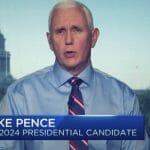CNBC Digital Video: Senator Cory Booker Sits Down With CNBC Editor At Large John Harwood
WHEN: Thursday, June 13th
WHERE: CNBC.com’s Speakeasy with John Harwood
Q1 hedge fund letters, conference, scoops etc
Of all the Democratic presidential candidates, none delivers a speech any better than Cory Booker. The New Jersey senator declares his commitment to the disadvantaged with the passion of a preacher, the intellect of a Rhodes Scholar, the street-smarts of a former Newark mayor. At 50, he retains the imposing presence of his days playing top-level college football at Stanford. Those gifts marked this African-American politician as a rising star before Barack Obama smashed racial barriers to win the White House. Now Booker seeks to leverage them in the jam-packed race for his party’s 2020 nomination. He faces big challenges - from better-known veterans former Vice President Joe Biden and Sen. Bernie Sanders, to formidable female colleagues Sen. Elizabeth Warren and Sen. Kamala Harris, to emerging young contender and South Bend, Ind., Mayor Pete Buttigieg. Polls show him mired in single digits. But Booker’s strengths mean no one can write him off yet, fewer than two weeks before the first televised debates. He has assembled an extensive on-the-ground campaign team in Iowa, whose caucuses kick off the nominating process next February. A partial transcript from Speakeasy with John Harwood featuring Senator Cory Booker follows.
To listen to the extended interview, subscribe to the Speakeasy with John Harwood podcast on Apple Podcasts or wherever else you listen.
John Harwood: One of the divides in this race is between people who define themselves by wanting to fight with the other side, and those who want to reconcile. What is the episode that happened in the last couple of days for Vice President Biden – does that tell you that the reconciliation side of this argument is the short side?
Cory Booker: Well, I don’t necessarily subscribe to the premise that there’s fighters and reconcilers.
John Harwood: Radical love.
Cory Booker: And yet you and I both know that it was radical love that showed some of the fiercest fighting during the Civil Rights movement. They didn’t bring bigger hoses and bigger dogs to beat Bull Connor, but they fought him with a toughness and a grit, unarmed truth, unyielding love, that transformed our nation. That’s how bullies and demagogues have always been beaten. I don’t think we’re going to beat Donald Trump using his tactics on his turf, but they called for the moral imagination of a country and transformed it.
John Harwood: But there are some constituencies that some people in your party think you love a little bit too much, which is why I raised that question. Pharma, a home state industry, Wall Street, Silicon Valley. Is that a problem for you?
Cory Booker: Well, I think it’s a problem if people have a very shallow analysis of my history. I have spent half my life now living in some of the lowest income communities in our country. I love Newark, New Jersey and we don’t confuse wealth with worth. And the whole world I see really is a lens through those communities who have been left out and left aside. So if you look at my record on Pharma, God, I’m on every single bill. I’ve authored bills with people like Bernie Sanders to take down these awful prices.
John Harwood: When you got to the Senate, you were part of the small group of Democrats who opposed the drug importation resolution.
Cory Booker: No. That’s how these things spin on the internet. A lot of people try to point to a late night messaging, non-binding amendment that I voted against.
John Harwood: You think that was a meaningless vote?
Cory Booker: It was an amendment that even if it passed, it would’ve had no change in law, nothing at all. It was a messaging amendment. But it didn’t have the language I wanted, so I went and actually wrote a real piece of legislation, got Senator Sanders to work with me to do something about it. Some non-profit looked at who voted where on Wall Street issues, and they said 0% of times that I vote for Wall Street interests that were trying to do things like undermine regular, common-sense regulations. I’m a person that is in this to fight for low income Americans. We’ve stripped the dignity from work. We’ve undermined our capitalist system, to now make it a system that benefits overwhelmingly, not shared growth and shared prosperity, but more and more concentrations of power. We’re using that power to undermine our politics in Washington.
John Harwood: Speaking of concentrations of power, Mark Zuckerberg gave you several hundred million dollars for a school initiative that you had when you were in Newark. Is somebody like Mark Zuckerberg part of the problem, or part of the solution?
Cory Booker: Well, I want to take a step back because I think America, I hope they know the story, which is as a mayor who had no control over my schools, a school system undertaken by the state, and I was one of those mayors that said I’m taking responsibility. I may not have legal authority, but I’m going to find bold ways to create transformative change. He was an extraordinarily impactful philanthropist in our city because that gave us a lot of momentum to make change. Now, Facebook is really problematic. They’re doing things that all of us in America – we just saw a Mueller report that pointed to how foreign adversaries were using platforms like Facebook.
John Harwood: But you’re not willing to say Facebook should be broken up?
Cory Booker: I’m willing to say that we need to look at tech companies in general, because we have a problem in this country with corporate concentrations of power that are undermining basic free-market, basic democratic ideals. So if I am the leader of this country, which I hope I am, I’m going to be coming after hard these large monopolistic companies.
John Harwood: But the fact that Zuckerberg was a supporter of your initiative in Newark, with a lot of money, that’s not the reason why you will not specifically, like Elizabeth Warren, say “break up that company”?
Cory Booker: Oh there needs to be a lot of companies in America that are broken up. But it needs to be done in a sobered, systematic way.
John Harwood: Let’s talk about Wall Street for a second. Jamie Dimon’s the head of JP Morgan Chase. He put out a statement this year to shareholders and said that the tax cut was working. He supported the Trump tax cut. But he also said that the social needs of too many Americans are not being met. Is he part of the problem, or part of the solution?
Cory Booker: You know, the rules of Wall Street, and again, I see things with a lens of an inner city low-income community. The games that they played that rigged system hurt my community. It aggravated the racial wealth gap. There’s a lot of ire that I have for the way the rules have been written. We have got to make sure that this economy is working for the ideals that we taught. That’s why I passed the piece of legislation with Tim Scott, across the aisle, for opportunity zones. We actually have a system now that’s designed against building companies to last. That’s being built to drive profits to people on Wall Street. And it’s hollowing out – we’re in Iowa – it’s hollowing out communities like this and hurting what are I think, basic capitalistic ideals.
John Harwood: Some of your colleagues in the race are for a wealth tax – Elizabeth Warren – for a financial transaction tax. Are you for those?
Cory Booker: I’ve said that we have a massive revenue problem in this country and we need to do things to bring more revenue in. The first idea of a wealth tax, I don’t agree with Elizabeth Warren’s plan. I believe that we should tax capital gains as ordinary income. That’s going to bring a tremendous amount of money. I think we need to raise marginal tax rates.
John Harwood: How high?
Cory Booker: That’s something that’s going to be negotiated, but they need to go up.
John Harwood: Is there a rate that you think it shouldn’t go above that? 50%?
Cory Booker: Of course, I would not go above 50%. Rolling back these toxic Trump tax cuts alone, to me, is important.
John Harwood: What about a transactions tax?
Cory Booker: Hold on, because this is really important. We were sold this tax cut that is going to blow up our economy so much that it’s going to pay for itself. We are now seeing, under this president, stunning levels of deficit spending that are going to get us to the point in a matter of years where interest on debt is going to be more than our military budget. A transaction tax, that’s not something that’s in my plan. But what we have to start talking about is a system that is being designed in a very corrupt fashion.
John Harwood: You have a pretty aggressive plan to curb stock buybacks. Hasn’t gone anywhere in the Congress, but it would make a significant change. Would you do anything about the widening ratio between CEO pay and average worker pay, which has exploded in the last couple of decades?
Cory Booker: A couple things. One is, we know stock buybacks, in the 80s was illegal. It was called stock manipulation, and we should start having conversations about the structural things that have changed our economy, that have concentrated power in the hands of the few, and undermined the shared wealth and prosperity of a vibrant entrepreneurial society that values the labor and the cost of labor. These are larger conversations that we need to have. The incredible wealth disparities that we’re seeing right now, and the incentives we’re giving CEOs on how to make money – remember we talked earlier – by incentivizing people towards quarterly earnings and not incentivizing to creating value – not value just for shareholders, who might hold your stock for 10 minutes.
John Harwood: Is that how to deal with CEO, pay rather than direct regulation?
Cory Booker: I think we’ve got to have a conversation about how to do that. I’m talking to some of the best economists that really are focused on the values that I’m focused on.
John Harwood: Don’t have a plan now on that?
Cory Booker: I don’t have a plan now on that.
John Harwood: You’ve got aggressive plans for baby bonds, which are designed to close the racial wealth gap, and also rental subsidies, which a lot of people on the left like it, would cost about two trillion dollars over 10 years. Do you think that you need to pay for that? That’s more than you could get by just rolling back the Bush tax cuts. Or do you subscribe to the idea that some Democrats have, which is they didn’t pay for their tax cut, we don’t need to pay for our stuff either. Deficits are overrated.
Cory Booker: I’m not going to tell you deficits are overrated. I know too much about math to tell you that. When you say I can’t pay for it just by rolling back the Trump tax cuts, I can tell you from the estate tax to the Trump tax cuts to taxing – I could give you the math on how we’re going to do this. But I also want to challenge you because this is what I get. Please move to my neighborhood for one month, and you will see how expensive poverty is to this country. We have a system that seems to be so much more comfortable with paying for the cost of poverty than making strategic investments on the front end, that not only would save us in taxpayer dollars, but would elevate human potential. When you elevate human potential, children in my neighborhood in Newark, that genius, that’s the most valuable natural resource any country has, because that genius could be inventors and artists that can trigger societies.
John Harwood: You’ve said on Medicare-for-all that you are going to be pragmatic, and not let the perfect stand in the way of the good. Same position on Green New Deal?
Cory Booker: Well, look, we are a country that needs to have bold plans to solve our challenges and the environment. I’m going to be a president who says, “This is not an issue. This is how we’re going to look at everything from our foreign policy, and our trade deals, and billions of dollars of foreign aid. This is how we’re going to look at our ag bills. We’re going to look at our Department of Transportation.” Everything has to be done with an urgency for dealing with the planetary peril that we have. We can actually grow our economy, create better jobs, and show this country, this planet, a model for how to deal with this problem.
John Harwood: You talked about the importance of unions. One of the big issues in the tech industry is the gig economy. Should workers in that economy be considered employees rather than contractors?
Cory Booker: I think that we have to change. I mean, Uber drivers – I can go through the folks that I think are getting a raw deal. We have got to make this new work, we have to view work in this country differently and that means dealing with everything from portable benefits to how we’re going to deal with retirement security. But even changing the understanding of what work is. And what we were talking about before with Jamie Dimon. I had this conversation with him, where I went at him. The New York Times did this great article: a janitor that worked for Kodak, versus a janitor that works for Apple. The janitor who worked for Kodak actually worked for Kodak, got the benefits, they got tuition assistance programs, retirement benefits, had dignity. They followed this woman in that article, that worked up to middle management - a great American story. The janitor who worked for Apple doesn’t work for Apple anymore. Their wages have been suppressed. They don’t have benefits. They don’t have retirement security. That person can’t go to school at night and rise. And so that is the unfair change in our economy. I bring up Jamie Dimon because I had that conversation with him. He actually hired back a lot of the people that work in his building. Because he was like, “You’re absolutely right.” We cannot create a corporate culture that is anti-free market, anti-capitalism. That’s what we’re doing. We have got to create a system that promotes the kind of growth we’re going to need in the future.
VIDEO EXTRAS:
Booker On Seeking A Different Path
John Harwood: It has now come out that China, as part of the conflict with the Trump administration, in recent days has summoned tech executives and said, “If you play ball with the administration and shut out sales to Chinese firms, you’re going to pay a price for that.” What would you tell tech companies when they see what the administration is doing and hear that from China?
Cory Booker: Well, first of all, you have to understand, as a former football player, what Donald Trump is doing right now is basically cursing out his team and trying to go on the playing field - one guy against Notre Dame, for crying out loud. That’s ridiculous. Here’s a guy that started this fight by saying, “Not only am I going to put tariffs on China, but I’m going to put tariffs on all of our allies, too. In fact Canada up there, I’m going to use a national security waiver to put tariffs on Canada.” I know that Trudeau is really menacing, especially to guys like me - that hair of his is scary. But Canada is not our enemy. They’re not a national security threat. And so he basically at a time where we could have unified our allies to show real strength, because it is not just our tech companies that are being talked to like this, it is European tech companies, its Canadian tech companies. China is playing an unfair game and their goal is to keep us divided.
John Harwood: So what do you tell these tech companies who get this message from China?
Cory Booker: Well, if I’m president of the United States, I’m going to, first of all, have a real strategy. We have a president who is doing foreign-policy by tweet. I disagree with the Trump administration. So what I do have more of a problem with is the tech companies who are allowing China’s values on privacy, on security, using those tech platforms to squelch the human rights of others to surveil their citizens. These are things that I have a problem with. Tech companies are willing to sacrifice values for profit. That’s unacceptable to me.
John Harwood: You talked about the need for alliances to take on China. Do you want to be known as a pro-trade Democrat? And specifically, would you re-join the Trans-Pacific Partnership if you became president?
Cory Booker: So I want to be known as a pro-fair trade Democrat. Not trade in a way that’s going to put American workers in the cross-hairs.
John Harwood: Do you think President Obama put American workers in the cross-hairs with the Trans-Pacific Partnership?
Cory Booker: I think the global trade agreements that we have been in, we did not have a plan for factory workers in the Midwest, for small businesses in New Jersey. We did not account for how globalism was going to severely hurt people in America.
John Harwood: So you think TPP was bad?
Cory Booker: I’m telling you what was bad was that we did not have a comprehensive plan. And so what I’m saying to you is, Switzerland has a program that if you lose your job, say globalism kills a company, you go right into an apprenticeship that holds your salary and trains you for a modern job. That’s a message that’s very different than what we’ve been doing.
John Harwood: But if you say you can’t take on China alone, you need to do it with allies, you’ve got to pick an approach. Doesn’t picking an approach mean TPP? That was the approach. You had 12 other countries.
Cory Booker: And I’m not going to submit to that binary analysis that you have because again, you’re not talking to someone who hasn’t run something. Who hasn’t had to make tough choices in an economy about how I’m going to attract business. And so we did things in Newark that took a city that was in 60 years of financial decline and turned it around. You’re talking to a guy who actually knows how to turn around an economy. Not just any economy, but one of the toughest places to turn around an economy in the country. And we did it not by falling into the false choices that you’re giving us.
John Harwood: But just to clarify this point: are you saying you want a TPP, but a better one than they negotiated? Or you don’t want a Trans-Pacific Partnership?
Cory Booker: I’m saying that if we are going to win in Asia, we need to bring together the allies that we have there, and do a deal that works for us to counter and check China in a substantive way.
John Harwood: Which is what TPP was.
Cory Booker: Which is not what TPP was. There were real problems with TPP that I had. I’m telling you, that’s what the binary choices that we’re given as a country, and it’s a lose-lose choice. What I’m saying to you is, workers need to be at the center. Environmental issues at a time of global climate change, need to be at the center of these negotiations, and they’re not.
Booker On His Movie Moment
John Harwood: When I talk to Democrats, the biggest criticism relates to a notion that arose in your “I am Spartacus” moment in those judiciary hearings. The idea that show horse rather than workhorse.
Cory Booker: Well, first of all, you know I’ve been in the Senate for five or six years. Nobody can point to any other moment. In that moment, if you actually listen to it, I wasn’t talking about myself. I was talking about Dick Durbin. When a Texas Senator literally said, “I’m going to make sure you’re thrown out of the Senate.” Dick Durbin stands up and says, “You throw him into the pit, throw me there too.” And I was like, “Oh my God, I literally just had a senior Senator from Illinois saying, ‘If I’m going to get kicked out of the Senate, he wants to go too.’” And I’m like, “Basically, that was the closest I’ll ever come to seeing an I am Spartacus moment.” So I was talking about him. But again, we live in this echo chamber that people will try to take out something you say. I’ve spent six years in the Senate and you can barely find moments where I popped up above the radar screen, because I was going to work with people on the other side of the aisle. I passed legislation with Ted Cruz to protect after disasters. I’ve passed legislation and amendments with people you consider right-wing conservatives, like Chairman Inhofe.
John Harwood: Do you think you can work with those guys as president?
Cory Booker: Again, the only major bipartisan bill that passed under this president was the one that I led, on the Senate side, by working with people like Chuck Grassley. The bipartisan bill for opportunity zones with a guy on the other side of the aisle. This is a time where we, all of us, have to say, “How can we be falling into tribalism as a nation, when our very ideal is to put more indivisible in this one nation under God?” Tribalism is fear-based, zero sum gain, us against them. That’s actually not how markets work. Markets say that if you’re doing better, it’s going to have a multiplier effect and help me do better as well. We have to get back to a country that has these ideals of that beloved community. We need to get back to understanding we’re in this together. And my biggest fear is that this election is going to become a referendum on one guy and one office. What it needs to become is a referendum on who we are to each other, the soul of our nation. We’re so busy fighting each other. When I played football, if I heard the other huddle on defense starting to fight amongst each other, tear each other down, I would turn to my guys in the huddle and say, “We’re about to score a touchdown.” That’s where we are. While we are at each other’s throats, not even doing the things that the polls show we agree on. America agrees you shouldn’t put aside lifesaving prescription drugs because you can’t afford them. America agrees that we shouldn’t treat our mental health problem in prisons and jail. It’s just so much more expensive. We agree on these things, but we’re not getting things done. I’m running for president, not just because I want to beat Donald Trump. Yeah, I want the guy gone. But I’m actually running for president, because I want to unite this country, not because of what I’m against. It’s about what I’m for and who I’m for.
Booker On Courting Black Voters
John Harwood: You’re in a bit of a sub-competition with Senator Harris because black voters are a very significant part of this contest. You’re going to South Carolina in a couple of days to talk to Black Economic Alliance. What’s your message to them and why you?
Cory Booker: First of all, I know the pundits like to try to figure out who’s competing in lanes and so on and so forth. I’m in a track race here. I’m not looking to the lane next to me. I’m running my race. My message very clearly to African-Americans who are concerned about economy and jobs, access to capital and those issues, is number one, I’m the only person in this race that’s been a CEO, chief executive of a major minority city, majority black and Latino. We have shown that we have strategies to create better access to capital, to create better jobs, to turn around our economy, to show shared growth, to fight against the ills of gentrification. I’ve got a record for doing some pretty incredible things. Even in the Senate, from passing the only major bipartisan piece of legislation I led from the Democratic side with Dick Durbin in the Senate for mass incarceration, the legislation I passed on empowerment zones. My message to folks is very simple. I’m a proven leader, under difficult circumstances, working for inclusive economic growth. And I’m going to be the champion that makes this economy work for all people, especially communities like the one I come from, or communities, like many here in Iowa, that have been too long overlooked, under-valued, under-appreciated, under invested in. They need to have a seat at the table.
John Harwood: In first quarter fundraising, two candidates got more than 50% of their money from large donors, you and Senator Harris. What does that tell you?
Cory Booker: I think it tells you we’re growing our list out. I haven’t run a race since 2014. People who’ve run races in 2018 - heck, Heidi Heitkamp, my dear friend, has a bigger email list than us because people who ran in 2018 had a lot of agenda and energy. We’re growing our small online contributions. I’m excited that we made the debate stage with having over 60,000 or 70,000 individual donors. And we’re continuing to grow momentum in this campaign.













